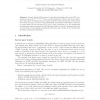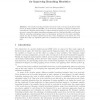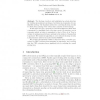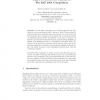105
click to vote
SAT
2004
Springer
15 years 6 months ago
2004
Springer
Linear Pseudo-Boolean constraints offer a much more compact formalism to express significant boolean problems in several areas, ranging from Artificial Intelligence to Electroni...
SAT
2004
Springer
15 years 6 months ago
2004
Springer
Abstract. Recently Schuler [17] presented a randomized algorithm that solves SAT in expected time at most 2n(1−1/ log2(2m)) up to a polynomial factor, where n and m are, respecti...
SAT
2004
Springer
15 years 6 months ago
2004
Springer
We propose and study a technique to improve the performance of those local-search SAT solvers that proceed by executing a prespecified number of tries, each starting with an eleme...
SAT
2004
Springer
15 years 6 months ago
2004
Springer
Abstract. This paper discusses an NP-complete constraint satisfaction problem which appears to share many of the threshold characteristics of SAT but is similar to XOR-SAT and so i...
SAT
2004
Springer
15 years 6 months ago
2004
Springer
The variable branching heuristics used in the most recent and most effective SAT solvers, including zChaff and BerkMin, can be viewed as consisting of a simple mechanism for rewa...
SAT
2004
Springer
15 years 6 months ago
2004
Springer
The Boolean circuits is well established as a data structure for building propositional encodings of problems in preparation for satisfiability solving. The standard method for co...
126
click to vote
SAT
2004
Springer
15 years 6 months ago
2004
Springer
We present a novel expansion based decision procedure for quantified boolean formulas (QBF) in conjunctive normal form (CNF). The basic idea is to resolve existentially quantifie...
SAT
2004
Springer
15 years 6 months ago
2004
Springer
The finite model generation problem in the first-order logic is a generalization of the propositional satisfiability (SAT) problem. An essential algorithm for solving the proble...
SAT
2004
Springer
15 years 6 months ago
2004
Springer
Abstract. For the third consecutive year, a SAT competition was organized as a joint event with the SAT conference. With 55 solvers from 25 author groups, the competition was a cle...
SAT
2004
Springer
15 years 6 months ago
2004
Springer
This paper reports about the 2004 comparative evaluation of solvers for quantified Boolean formulas (QBFs), the second in a series of non-competitive events established with the a...




